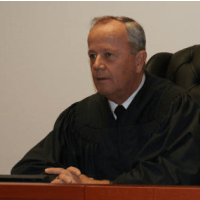Government Accused of Secretly Destroying Evidence Requested by Defense in 9/11 Trial
 Col. James Pohl
Col. James Pohl
By Charlie Savage, New York Times
WASHINGTON — The government has secretly “destroyed” evidence that is relevant to the death penalty trial of the five Guantánamo Bay detainees accused of aiding in the terrorist attacks of Sept. 11, 2001, two defense lawyers for Khalid Shaikh Mohammed, the self-described architect of those attacks, said on Wednesday.
The dispute appears likely to add a new chapter to the problems that have plagued the effort to bring the case before a military commission, which has been bogged down for years in pretrial proceedings. The defense lawyers are asking for the judge overseeing the case, Col. James Pohl of the Army, and the prosecution team, led by Brig. Gen. Mark S. Martins, to be recused from further involvement and for the case to be shut down.
The defense lawyers, David Nevin and Maj. Derek Poteet, said they were not permitted to say what the evidence was, or what exactly happened to it, because the underlying issue was classified. But Nevin characterized it as “favorable” to the defendants, and Poteet said it was “important or even critical” to any eventual trial, including in terms of weighing what sort of punishment should be imposed if the defendants were convicted.
Poteet also said the defense was informed in February that Pohl had approved a plan by the government to give the defendants a government-prepared “summary of a substitute” for the original, classified evidence that is no longer available. He provided no further details about what the alternative evidence consisted of.
Still, the defense lawyers offered several clues from the unclassified portion of their filing, which they submitted Tuesday but is not yet publicly available. They said the issue traced back to several years ago, when the question of the evidence’s fate first arose. Pohl eventually issued an public order, at the defense’s request, requiring it to be preserved, and they thought that had settled the matter.
But they learned in February, they said, that about 20 months earlier, and without their knowledge, prosecutors had obtained from Pohl a secret order that reversed his previous decision. By the time they found out, the government had already destroyed the evidence, giving them no opportunity to challenge the move.
Poteet said their motion portrayed this event as having created at least the appearance of Pohl “colluding with the government,” damaging the defendants’ right to a fair trial. He also said the government had said it would not allow the defense access to any other evidence of a similar kind and would instead use similar substitutions.
The dispute may center on one of the overseas facilities where the Central Intelligence Agency formerly ran a “black site” prison where Mohammed was tortured before his transfer to the military-run prison at Guantánamo Bay, Cuba, in 2006.
The defense strategy has been to argue that their clients’ lives should be spared as mitigation for the government’s abuses of them in the black-site prisons, which were reportedly in Thailand, Poland, Romania, Lithuania and Afghanistan, and at a secret site at the Guantánamo base.
In September 2012, defense lawyers submitted a joint motion to require the government to “preserve any existing evidence of any overseas detention facility used to imprison any of the defendants or potential witnesses in this case, including maintaining any structure or fixture in its current state.”
“Given the realities of this case, it is certain that what occurred during that detention will be at issue at the pretrial, trial and (if necessary) sentencing phases of these proceedings,” the motion said. “The conditions under which the accused were detained will be highly significant to the defense sentencing case.”
On Dec. 19, 2013, over the government’s objections, Pohl issued a public order granting the request.
Asked whether what they had learned was that the government later secretly obtained Pohl’s permission to alter one or more of the CIA facilities that had hosted a black-site prison, the defense lawyers said they could not comment.
Asked the same question, Dean Boyd, a CIA spokesman, said the agency “has complied with all applicable preservation orders in this matter.”
Cmdr. Gary Ross, a spokesman for the Office of Military Commissions, said, “It would be inappropriate to comment on a document not yet released to the public.”
To Learn More:
9/11 Defendants Accuse Feds of Illegally Redacting Guard Testimony on Prisoner Treatment (by Lacey Johnson, Reuters)
Lawyers for 9/11 Defendants Criticize Military’s Selective Release of Torture-Related Documents (by Lacey Johnson, Reuters)
Unexplained Blackout of Discussion of CIA Interrogation Centers at 9/11 Pre-Trial Hearing (by Noel Brinkerhoff and Danny Biederman, AllGov)
Military Judge Orders Guantánamo Prisoners not to Talk in Court about being Tortured (by Noel Brinkerhoff, AllGov)
- Top Stories
- Unusual News
- Where is the Money Going?
- Controversies
- U.S. and the World
- Appointments and Resignations
- Latest News
- Musk and Trump Fire Members of Congress
- Trump Calls for Violent Street Demonstrations Against Himself
- Trump Changes Name of Republican Party
- The 2024 Election By the Numbers
- Bashar al-Assad—The Fall of a Rabid AntiSemite






Comments